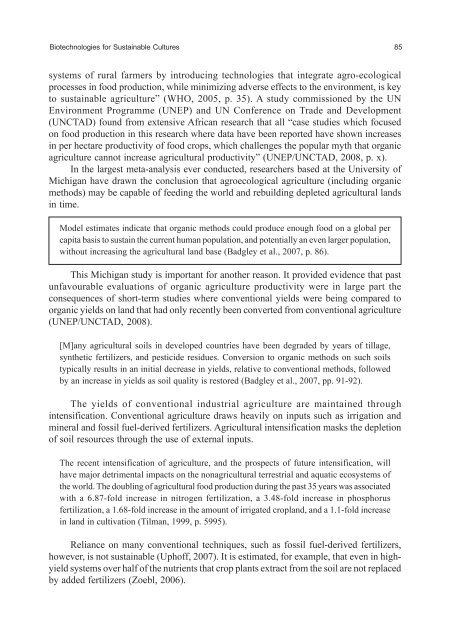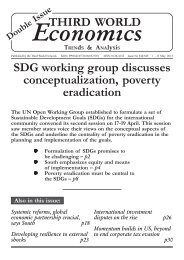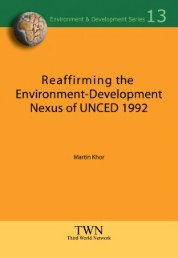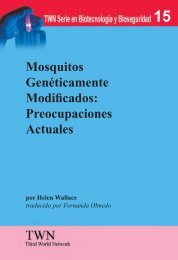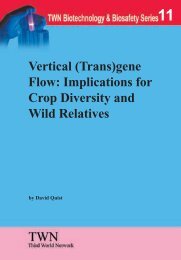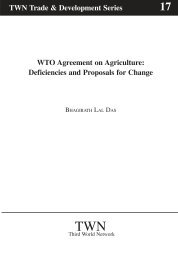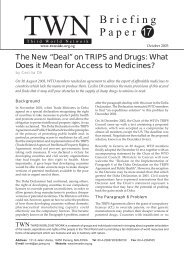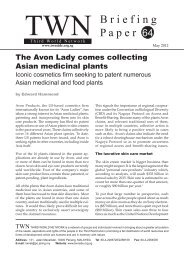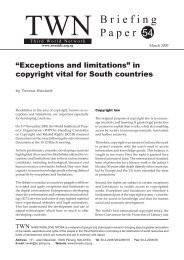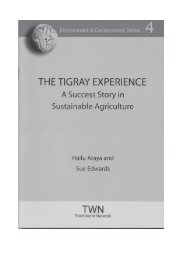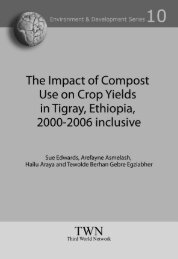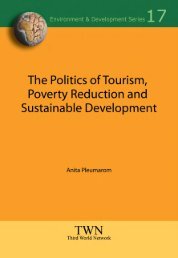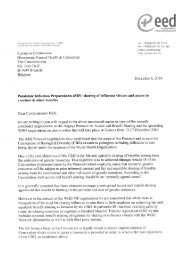Hope Not Hype - Third World Network
Hope Not Hype - Third World Network
Hope Not Hype - Third World Network
- No tags were found...
Create successful ePaper yourself
Turn your PDF publications into a flip-book with our unique Google optimized e-Paper software.
Biotechnologies for Sustainable Cultures<br />
85<br />
systems of rural farmers by introducing technologies that integrate agro-ecological<br />
processes in food production, while minimizing adverse effects to the environment, is key<br />
to sustainable agriculture” (WHO, 2005, p. 35). A study commissioned by the UN<br />
Environment Programme (UNEP) and UN Conference on Trade and Development<br />
(UNCTAD) found from extensive African research that all “case studies which focused<br />
on food production in this research where data have been reported have shown increases<br />
in per hectare productivity of food crops, which challenges the popular myth that organic<br />
agriculture cannot increase agricultural productivity” (UNEP/UNCTAD, 2008, p. x).<br />
In the largest meta-analysis ever conducted, researchers based at the University of<br />
Michigan have drawn the conclusion that agroecological agriculture (including organic<br />
methods) may be capable of feeding the world and rebuilding depleted agricultural lands<br />
in time.<br />
Model estimates indicate that organic methods could produce enough food on a global per<br />
capita basis to sustain the current human population, and potentially an even larger population,<br />
without increasing the agricultural land base (Badgley et al., 2007, p. 86).<br />
This Michigan study is important for another reason. It provided evidence that past<br />
unfavourable evaluations of organic agriculture productivity were in large part the<br />
consequences of short-term studies where conventional yields were being compared to<br />
organic yields on land that had only recently been converted from conventional agriculture<br />
(UNEP/UNCTAD, 2008).<br />
[M]any agricultural soils in developed countries have been degraded by years of tillage,<br />
synthetic fertilizers, and pesticide residues. Conversion to organic methods on such soils<br />
typically results in an initial decrease in yields, relative to conventional methods, followed<br />
by an increase in yields as soil quality is restored (Badgley et al., 2007, pp. 91-92).<br />
The yields of conventional industrial agriculture are maintained through<br />
intensification. Conventional agriculture draws heavily on inputs such as irrigation and<br />
mineral and fossil fuel-derived fertilizers. Agricultural intensification masks the depletion<br />
of soil resources through the use of external inputs.<br />
The recent intensification of agriculture, and the prospects of future intensification, will<br />
have major detrimental impacts on the nonagricultural terrestrial and aquatic ecosystems of<br />
the world. The doubling of agricultural food production during the past 35 years was associated<br />
with a 6.87-fold increase in nitrogen fertilization, a 3.48-fold increase in phosphorus<br />
fertilization, a 1.68-fold increase in the amount of irrigated cropland, and a 1.1-fold increase<br />
in land in cultivation (Tilman, 1999, p. 5995).<br />
Reliance on many conventional techniques, such as fossil fuel-derived fertilizers,<br />
however, is not sustainable (Uphoff, 2007). It is estimated, for example, that even in highyield<br />
systems over half of the nutrients that crop plants extract from the soil are not replaced<br />
by added fertilizers (Zoebl, 2006).


